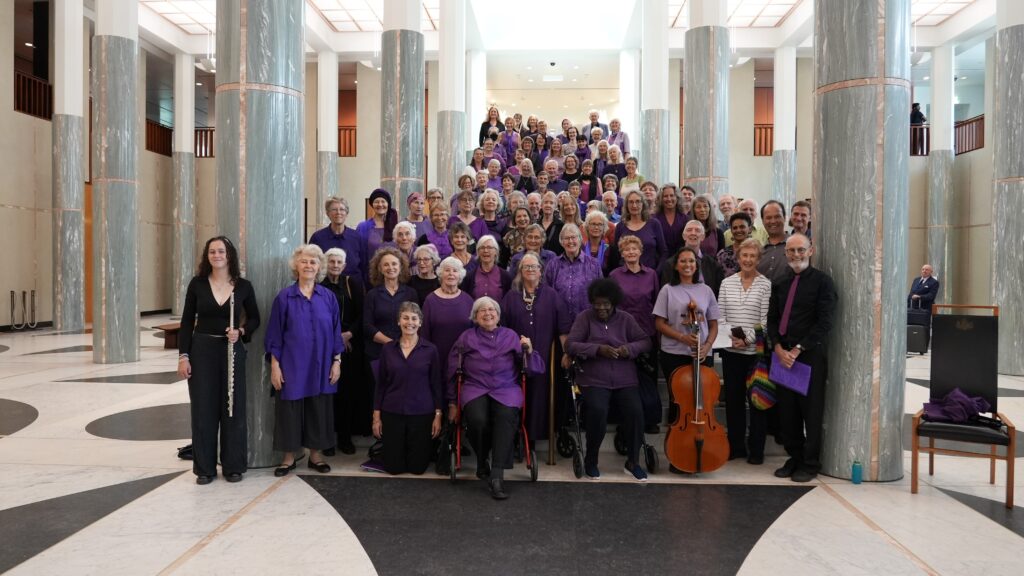Kirsten Anker recalls the powerful gathering of women that happened 20 years ago, after then Prime Minister John Howard announced Australia was joining the US-led invasion of Iraq. And why women are singing together again today.
On the 18th of April 2003, Prime Minister John Howard announced that Australia would join the US-led invasion of Iraq. On that same day, a group of about 150 women gathered in the foyer of Parliament House (in what may have been the first ever flash mob!) and sang a lament for the people of Iraq:
“…Weep for our sisters in danger/Weep for our brothers and children/Sound the song of grief and despair/Sound the lament for the Dead.”
Ultimately, over 300,000 Iraqi civilians died in that conflict.
On the 20th anniversary of that event, the women’s group, now A Chorus of Women, gathered together and sang The Lament again in Parliament House. This time, there were new words for the occasion, inviting the community to join in and “change lament to renewal” on behalf of children and the Earth.
Coincidentally, this performance came at a time when the Australian government had announced that it will spend around $370 billion in the context of the AUKUS agreement to increase the numbers and sophistication of Australia’s submarine fleet. This decision embodies a philosophy that we prepare for peace by preparing for war. However, A Chorus of Women’s song urges us instead to prepare for peace by building a permanent peace.
Permanent peace is more than merely the absence of war. It requires the work of building and nurturing relationships. Jane Addams, an American social activist and Nobel Peace Prize recipient, believed that peace was a continuing work-in-progress, anchored in social democracy and achieved through the challenging work of building and nurturing relationships. She observed that this is more likely to happen when we collaborate on a practical problem, because rigid ideology and moral judgements can be set aside. During collaboration conflicts inevitably arise, and we should strive to resolve them through “sympathetic knowledge” of other people, a courageous path of building connection through deep understanding and responding to other participants with empathy.
It was key for Addams that challenges around the problem be resolved through community participation and a scientific attitude. An important measure of success is that the lives of even the most vulnerable members of the community are improved: how can we claim to be at peace as a society when large numbers of us are struggling to live or to participate on an equal footing?
The Women’s Climate Congress, a national nonpartisan organisation, arose out of the 20-year legacy of Chorus and a strong desire for women’s voices to be heard on key issues. WCC has developed a Charter for Change in consultation with hundreds of women over several years that proposes some specific policies which can build this peace Jane Addams envisaged. These include changes in government towards greater participation generally and in particular, more deliberate inclusion of women in decision-making and women’s styles of leadership, which typically emphasise collaboration and greater kindness and compassion in government. And at this time, climate change is the obvious pressing practical problem that brings us together.
We are taking the Charter into communities to converse in circle with women and reflect on ways local communities can develop their own cultural, social, artistic, economic or operational responses to the problems that are arising for them.
Instead of spending $370 billion on submarines, an investment that would carry a better return for Australia would be an explicit budget of at least the same amount on building permanent peace: a just and equitable society, living within planetary constraints while providing a reasonable standard of living for all. Strengthening resilience nationally and in the region through forming strong relationships is also essential to pre-empt violent conflict over the inevitable disputes that will arise in a changing climate over water, food, land and resources.
We move forward by looking back. Let us heed the women of 1915, A Chorus of Women, and all others who are calling for lasting peace that is more than the absence of war. Let us set our sights on a better future – for the children and the Earth.

